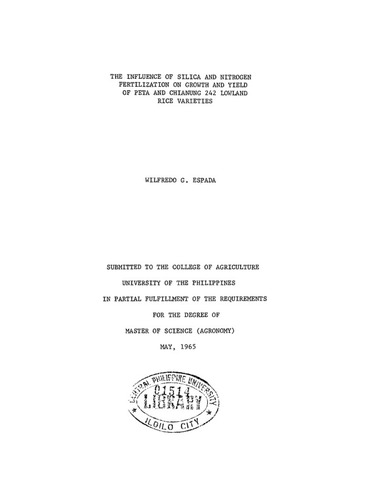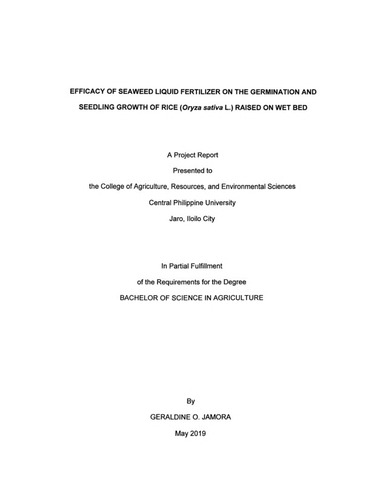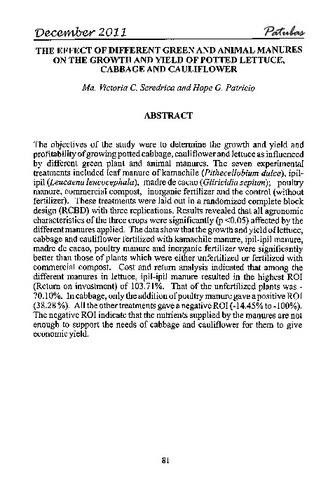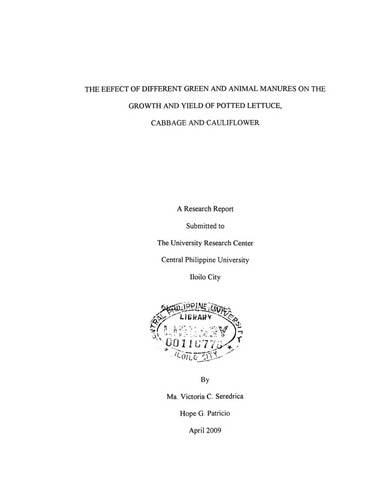Показать сокращенную информацию
The influence of silica and nitrogen fertilization on growth and yield of Peta and Chianung 242 lowland rice varieties
| dc.contributor.adviser | Moomaw, James C. | |
| dc.contributor.author | Espada, Wilfredo G. | |
| dc.date.accessioned | 2022-02-23T00:51:59Z | |
| dc.date.available | 2022-02-23T00:51:59Z | |
| dc.date.issued | 1965 | |
| dc.identifier.citation | Espada, W. G. (1965). The influence of silica and nitrogen fertilization on growth and yield of Peta and Chianung 242 lowland rice varieties (Unpublished Master’s thesis). University of the Philippines in Los Baños, Laguna. | en_US |
| dc.identifier.uri | https://hdl.handle.net/20.500.12852/1955 | |
| dc.description | Introduction | en_US |
| dc.description.abstract | Rice culture will remain the focus of agricultural research in Asia until more of the countries become self-sufficient in this crop. More scientific results from laboratory and field experiments must be pooled and applied in order to maximize rice yield. Legions of results on rice research seemingly make it difficult to bring values obtained in one place to another owing to the variety of climatic and soil conditions which offer strong interactions with the growth habit of rice plants. Nevertheless, an attempt to integrate these results and other findings will provide bases for smooth programming of the successful rice fanning enterprise. This integration will also unravel new techniques and improve the cultural methods which are indispensable to carry on effectively the program of increasing grain yield per unit area. Statistical reports indicate that the average production of the Philippines is only 27 - 30 cavans per hectare. This low yield can be attributed to lack of irrigation water, use of low amounts of fertilizer, ineffective pest control, reluctance of farmers to change antiquated farming practices to improved and scientific cultural methods, etc. The influence of nitrogen in increasing crop yield has been well established but application of nitrogenous fertilizer does not always result in an increase in yield of rice. Apparently the nitrogen requirement of rice plant may be satisfied by native or "fixed" soil nitrogen. However, the tremendous withdrawal by the rice crop for this element necessitates its return to the soil through fertilization or other means to maintain grain production. It has been suggested that silicon is essential in the medium to produce a normal rice crop. The role of silicon in relation to plant growth was studied more than three score years ago (Russell, 1961) but greater emphasis on its specific function in the rice plant has been investigated by Japanese workers only in the last decade. Research was focused on the significance of silicon in the mineral nutrition of the rice plant and the mechanical strengthening of the straw which offers a plausible mechanism for the resistance of rice to fungal diseases and insect pests. Results obtained, however, are not consistent, hence, the alleged physiopathological bearing of silicon to rice is not wholly accepted. Objectives of the study. The experiment had three purposes: 1. To study response of rice varieties to nitrogen and silicon fertilization 2. To compare the nitrogen, silicon, phosphorus, potassium, calcium, and magnesium status of the rice plants as influenced by nitrogen and silicon supply 3. To evaluate resistance of silicon-fertilized plants to rice stem borer | en_US |
| dc.description.sponsorship | International Rice Research Institute | en_US |
| dc.format.extent | 104 leaves | en_US |
| dc.language.iso | en | en_US |
| dc.subject.ddc | GSL Theses 630.72 Es58i | en_US |
| dc.subject.lcsh | Silica | en_US |
| dc.subject.lcsh | Nitrogen fertilizers | en_US |
| dc.subject.lcsh | Nitrogen | en_US |
| dc.subject.lcsh | Rice--Yields | en_US |
| dc.subject.lcsh | Rice--Growth | en_US |
| dc.subject.lcsh | Fertilizers | en_US |
| dc.subject.lcsh | Rice--Varieties | en_US |
| dc.subject.lcsh | Rice--Varieties--Testing | en_US |
| dc.subject.lcsh | Fertilizers--Testing | en_US |
| dc.subject.lcsh | Rice--Fertilizers | en_US |
| dc.title | The influence of silica and nitrogen fertilization on growth and yield of Peta and Chianung 242 lowland rice varieties | en_US |
| dc.type | Thesis | en_US |
| dcterms.accessRights | Not publicly accessible | en_US |
| dc.description.bibliographicalreferences | Includes bibliographical references | en_US |
| dc.contributor.chair | Moomaw, James C. | |
| dc.contributor.committeemember | Samanego, Ramon | |
| dc.contributor.committeemember | Vega, Marcos R. | |
| dc.contributor.committeemember | Ecsuro, Pedro B. | |
| dc.contributor.committeemember | Raymundo, M. E. | |
| dc.contributor.department | College of Agriculture | en_US |
| dc.description.degree | Master of Science (Agronomy) | en_US |
| local.subject.scientificname | Oryza sativa | en_US |
Файлы в этом документе
Данный элемент включен в следующие коллекции
-
Theses [10]





